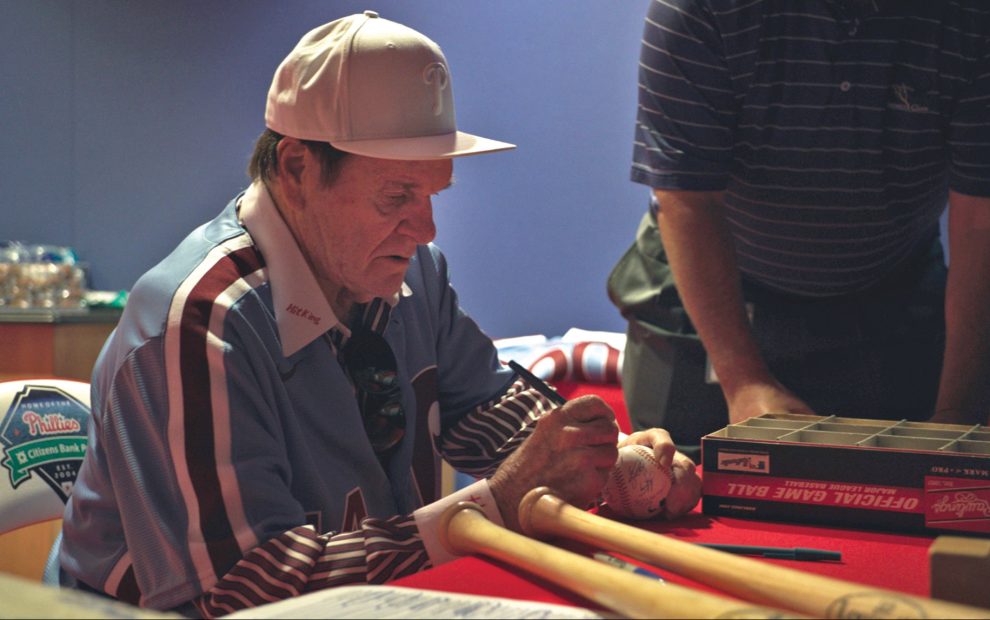Editors’ Note: Pete Rose passed away on September 30 at the age of 83. This column was written prior to his passing.
By the time you see this, Major League Baseball (MLB) will be well into its postseason playoff, with the World Series just around the corner.
I know, nobody cares. Football is America’s game now. But throughout most of the 20th century, baseball truly did live up to its title of America’s national pastime. It was one of the arenas in which U.S. culture absorbed generations of immigrants. America’s original sin of racism even played out at the ballpark, with the shame of all-white Jim Crow rosters and the glory that Black athletes and entrepreneurs made for themselves in the Negro Leagues. When baseball dropped its color line in 1947, it sent a clear signal that postwar America was going to be different.
In the last third of the 20th century, Pete Rose of the Cincinnati Reds was a central part of the baseball story. Even people who don’t follow the game may know two things about Pete Rose: One, he holds the record for most lifetime hits, and two, in 1989 he was banned from baseball and its Hall of Fame for betting on games, including ones involving his own team.
That paradox is central to the documentary series Charlie Hustle & the Matter of Pete Rose, now streaming in four parts on Max. “Charlie Hustle” was the nickname given to Rose as a player, because he did everything full throttle. He sprinted to first base when he drew a walk and might lower a shoulder and knock down a catcher at home plate to score a run. Rose was never the most talented man on the field, but he was always the most determined and hardest working. He was that emblematic American—the self-made man who would do anything to win.
In the docuseries, we see Charlie Hustle’s career highlights. We spend most of our time, however, with Pete Rose today; he’s now in his 80s, with an unsteady gait, an ever-present baseball cap, and “Hit King” embroidered on his shirt collar. This Pete Rose mostly reveals himself to be a mean, self-obsessed man apparently incapable of acknowledging the truth about his life or the gambling addiction that ruined it.
His gambling started early in the 1970s. At first, Rose bet on football and basketball, but he kept losing; when he crossed the line and bet on baseball, he started winning. Winning was always the point for Rose, so he kept chasing that thrill. Still, no one wins all the time. Rose’s debts brought him into contact with shady figures and led to his involvement with an operation moving cocaine from Florida to Cincinnati. One of his criminal associates eventually blew the whistle on Rose’s gambling.
When Rose was banned in 1989, he was the Cincinnati Reds manager. The next year, the team Rose had led won the World Series—and Rose watched it on TV, in the rec room of a federal prison where he was doing time for tax evasion.
In the years that followed, Rose supported himself by selling his autograph. He moved to Las Vegas, where the tourist trade brought a steady stream of customers, and where, by the way, sports gambling is legal. He never stopped trying to get back into baseball, but he’s never managed the display of genuine contrition that would require. He even refused to admit he had gambled on baseball at all until 2004; when he did confess, it was to sell a book he’d cowritten.
It all got worse for Rose in 2017, when John Dowd, the man who investigated Rose’s gambling for MLB, mentioned in a radio interview that an organized crime contact had told him he’d also supplied Rose with young girls, ages 12 to 14. Questioned about this in the documentary, Rose says, “Who cares what happened 50 years ago?”
At this point, there’s probably no chance that Rose’s ban from baseball will ever be lifted. But a campaign is going on to get him into the Hall of Fame before he dies. In the most recent national polling, about half the respondents think that, despite his crimes, Pete Rose should be in the Hall.
As journalist Ted Keith of the Sports Business Journal notes in Charlie Hustle, there is something “Trumpian” about Pete Rose. And, after four hours of immersion in his story, it’s hard to avoid that conclusion. As the film amply documents, Rose lies as easily as he breathes, but nothing will shake the support of his hardcore fans.
Just as Trump opened the floodgates for deception and vitriol in the political arena, Pete Rose may prove to be a forerunner in the world of sports. Since the Supreme Court allowed betting on athletic events in 2018, 38 U.S. states have legalized it, and sports have suffered a deluge of betting scandals. Just this year, Tucupita Marcano of the San Diego Padres earned a lifetime ban. And it’s not just the professionals who are betting; recently, the University of Notre Dame had to suspend its entire men’s swimming program because betting had become so pervasive.
Catholic Worker cofounder Peter Maurin used to say that the goal of Catholic social action was to make a world in which it was easier for people to be good. But the goal of post-industrial capitalism seems to be a world in which it is easier for people to become self-destructive and morally damaged. In recent decades, we’ve been throwing off old moral strictures left and right. However, at least in the case of sports gambling, it’s becoming clear that some of those barriers to self-indulgence may have existed for a reason, and we are going to miss them now that they’re gone.
This article also appears in the November 2024 issue of U.S. Catholic (Vol. 89, No. 11, pages 36-37). Click here to subscribe to the magazine.
Image: Courtesy of HBO














Add comment